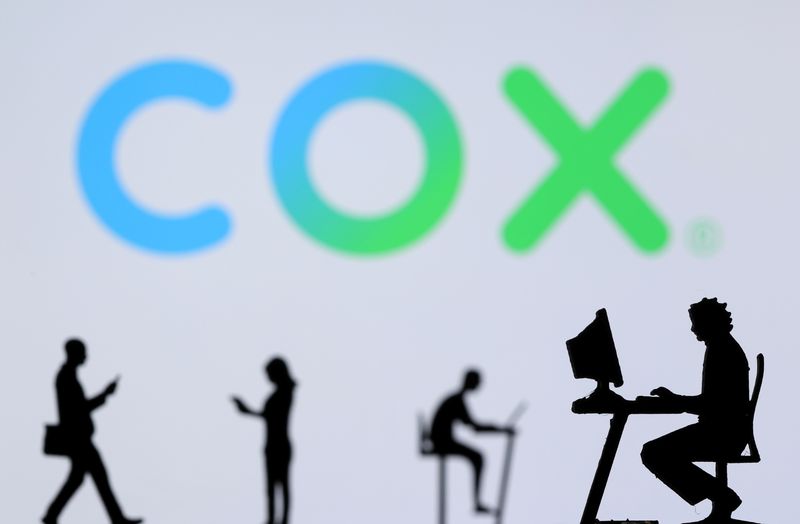By Aditya Soni, Jaspreet Singh and Milana Vinn
(Reuters) -Charter Communications on Friday agreed to buy privately held rival Cox Communications for $21.9 billion, combining two of the largest U.S. cable and broadband operators in their battle with streaming giants and mobile carriers.
The deal – one of the biggest globally this year – will bolster Charter’s push to bundle broadband and mobile services at a time when wireless carriers are luring internet customers with aggressive plans, while millions ditch traditional pay-TV for streaming services.
Analysts have said Charter’s strategy of combining internet, TV and mobile services into a single, customizable package has shown merit, but it needs scale as cable firms rely on leasing network access from major carriers to offer mobile plans. Charter leases wireless network capacity from Verizon.
“This combination will augment our ability to innovate and provide high-quality, competitively priced products,” said Charter CEO Chris Winfrey, who will head the combined company.
The merger will be among the first major tests of M&A regulation under the Trump administration, as it would create the largest U.S. cable TV and broadband provider with around 38 million subscribers, surpassing market leader Comcast.
U.S. Senator Amy Klobuchar, a Democrat from Minnesota on the Senate antitrust committee, said a review of the deal needs to “make sure this proposed merger does not harm consumers by adversely affecting competition or stifling innovation in cable and broadband markets.”
“Telecommunications services are essential to our economy, and I urge our antitrust enforcers to take an in-depth look at this merger to ensure it will not raise prices or create additional barriers to internet access,” she said.
It will likely be reviewed by the U.S. Department of Justice’s antitrust division. Assistant Attorney General Gail Slater, who leads the division, has made it clear she intends to focus on mergers that decrease competition in ways that harm consumers or workers.
“There is likely no significant direct competition between the two compared to the overall footprint so that should mitigate a lot of the competition concerns,” said Andre Barlow, an antitrust lawyer in Washington.
The DOJ will look instead at whether the merged company will have leverage over rivals, he said. The DOJ did so in 2016 when it cleared Charter’s acquisition of Time Warner Cable on the condition that the company not restrict programming providers from entering distribution deals with streaming services.
In a move some analysts saw as an attempt to bolster the deal’s antitrust appeal, Winfrey said the combined company would bring Cox’s customer service jobs back from overseas, but he did not specify how many. Charter’s customer service teams are already based entirely in the U.S.
“Antitrust concerns are legitimate. But in this era of deregulation, the merger would probably pass as long as they don’t upset the president,” said Emarketer analyst Ross Benes.
SYNERGIES
The companies said they expect to realize $500 million in cost savings within three years of the deal’s expected close in mid-2026.
Under the cash-and-stock deal, Charter will take on about $12.6 billion of Cox’s net debt and other obligations, giving the transaction an enterprise value of $34.5 billion.
Cox Enterprises, the family-owned parent of Cox Communications, will own about 23% of the merged entity, with its CEO Alex Taylor serving as chairman.
The combination with Charter will also allow Cox to become a part of a broader platform and offer more competitive offerings to their customers, said the source close to Cox’s thinking.
The combined firm will rebrand as Cox Communications within a year of the deal’s close, with Charter’s Spectrum being the consumer-facing brand. It will keep its headquarters in Stamford, Connecticut, while maintaining a big presence at Cox’s campus in Atlanta, Georgia.
Charter and Cox had also discussed a merger in 2013 before shelving the plan, according to media reports. The talks between the two cable providers had picked up and cooled off several times since then, according to a source close to the deal. This time, Charter had begun discussions with Cox in January, with the formal offer from Charter following within a month after the beginning of the discussions, the source said.
Cable billionaire John Malone said in November Charter should be allowed to merge with rivals such as Cox, shortly after Charter agreed to buy his Liberty Broadband.
Liberty Broadband shareholders will receive direct interest in Charter under the terms of the deal with Cox.
Citi and LionTree served as financial advisors to Charter, with Wachtell, Lipton, Rosen & Katz providing legal counsel. Cox Enterprises was advised by Allen & Company, while BDT & MSD Partners, Evercore, and Wells Fargo advised Cox Communications. Latham & Watkins served as legal counsel to Cox Enterprises.
(Reporting by Gursimran Kaur, Aditya Soni and Jaspreet Singh in Bengaluru; additional reporting by Jody Godoy in Washington; Editing by Mrigank Dhaniwala, Devika Syamnath and Nick Zieminski)




Add Comment